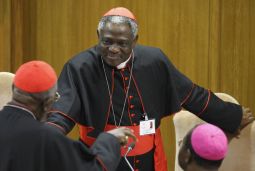Benedict for a New Dark Age
Celebrating Five Years With Pope Benedict XVI

Cardinal Peter Turkson, a native of Ghana, was named last October by Pope Benedict XVI as president of the Pontifical Council for Justice and Peace. He is archbishop emeritus of Cape Coast and was made a cardinal in 2003.
A few months ago, Pope Benedict XVI called me to Rome to head up a pontifical council. Its name, Justice and Peace, aptly describes its program and its goal: in the telling words of its founder, Pope Paul VI.
This global mandate suggests to me that the name chosen by our Holy Father may also indicate his own program and goals. Out of the Dark Ages, the first St. Benedict (c. 480-547) forged a new way of living cooperatively, intelligently and constructively — a way, in the long run, of building Europe at once humanly and spiritually.
Fifteen hundred years later, at the beginning of his pontificate, this holy man of deep faith chose the same name and called himself “a simple and humble laborer in the vineyard of the Lord.” The recent Second Synod for Africa, over which he presided, provided an opportunity to appreciate his method and his leadership.
At the inaugural Eucharist on Oct. 4, 2009, Pope Benedict XVI reminded everyone that a synod is not primarily a study session. Rather, it is God’s initiative, calling over 200 African bishops and others to listen — listen to God, to one another and to the world around us, in an atmosphere of prayer and reflection. And so he did, for three weeks, and so did we.
From Malawi comes a Chewa proverb: “Listening is an ancestral value — to listen carefully is of the Creator.” And traditionally, the greatest elder speaks last. After the synod itself and months of further reflection, we await Pope Benedict XVI’s apostolic exhortation for Africa and the whole Church in the new millennium.
His third encyclical, Caritas in Veritate, with recurrent references to earlier social doctrine, testifies eloquently to his method of attention. The Holy Father is a teacher with great passions for preserving tradition and consistency in the Church’s teachings. After listening to those before him and studying the whole corpus of knowledge handed down, he teaches for today’s Church and for the world of tomorrow. Most of all, he would have us live together as the brothers and sisters we are, in dignity and justice and peace. It is what we want. It is what we say we want. But this age seems dark, too, and we have yet to find a way.
May our Lord Jesus Christ grant his vicar Benedict XVI much courage, clarity and wisdom as he labors to listen and to teach and to show the way.
About This Series
Now more than ever, we need to be reminded of what a Pope is. On the rock of Peter our Church is built. To him and his successors — Christ’s vicars — have been entrusted the keys of the Kingdom of heaven. Christ prayed for him that his faith might not fail, that he might strengthen his brethren.
The untold story right now in the media is how much God has worked through Pope Benedict XVI in his first five years as Pope. That’s why we began to commission short essays to honor him for his anniversary just a few weeks ago.
As the media tries in vain to pin the lion’s share of the blame for the developing abuse scandal on him, those essays are now taking on a meaning and depth we couldn’t have imagined. We’re fortunate to have this man leading us, and these tributes tell why.
We hope you enjoy reading them as much as we did.
— The Editors













